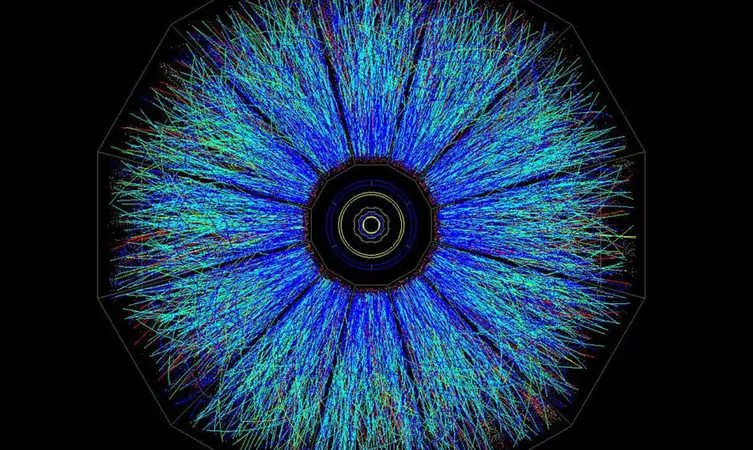
Breakthrough Discoveries Unravel the Mystery Behind Persistent Crohn’s Symptoms!
2024-12-20
Author: Ming
Groundbreaking Study from the University of Michigan
A research team from the University of Michigan has made significant strides in understanding why some individuals with Crohn's disease continue to experience debilitating symptoms, even when their condition appears devoid of inflammation. Their groundbreaking paper, titled “Why Symptoms Linger in Quiescent Crohn’s Disease: Investigating the Impact of Sulfidogenic Microbes and Sulfur Metabolic Pathways,” has been published in the journal *Inflammatory Bowel Disease*.
The Challenge of Quiescent Inflammatory Bowel Disease
Alarmingly, approximately one-third of individuals diagnosed with quiescent inflammatory bowel disease—notably Crohn's disease—still report lingering symptoms. To tackle this perplexing issue, the researchers previously examined the gut microbiomes of two groups: patients experiencing ongoing symptoms versus those enjoying a symptom-free state. Their findings were startling; they discovered a “significant enrichment” of sulfur-producing bacteria in the gut microbiomes of those who continued to experience discomfort.
Linking Symptoms to Sulfidogenic Microbes
In their latest study, the researchers have expanded upon these findings, solidifying the connection between symptom persistence and the presence of sulfidogenic microbes. The stool samples from patients with quiescent Crohn's disease revealed an increased concentration of these sulfur-processing bacteria, hinting at a potential causative role.
Impact of Hydrogen Sulfide on Gut Functionality
Dr. Allen Lee, a co-senior author of the paper, noted, "This connection is particularly intriguing as it backs up our previous research. These sulfur-producing bacteria are capable of generating hydrogen sulfide, which can adversely affect gut functionality."
Understanding Leaky Gut
Hydrogen sulfide can disrupt the gut barrier’s ability to regulate which substances can pass through, a phenomenon often referred to as “leaky gut.” Moreover, it may also contribute to an increased sensitivity in the gut, complicating the patient experience.
Revisiting Medical Theories
Initially, the medical community theorized that hidden subclinical inflammation might explain the ongoing symptoms in patients with quiescent Crohn’s disease. However, it soon became evident that symptom persistence was prevalent in both those who achieved complete remission and those who had not, leading scientists to explore the gut microbiome.
Study Scope and Findings
This most recent study analyzed 39 symptomatic patients versus a larger group of 274 asymptomatic patients with quiescent Crohn's disease, unveiling significant metabolic differences in their fecal samples. Alarmingly, these ongoing symptoms can severely impact the quality of life, pushing affected individuals toward higher medical expenses and an increased risk of opioid dependence.
Quality of Life Concerns
Dr. Lee observed, “The burden of symptoms in patients with quiescent Crohn’s disease mirrors that of individuals with active Crohn’s disease, underscoring a critical quality-of-life concern that needs to be addressed.”
Future Research Directions
To further investigate this phenomenon, the researchers are conducting a separate cohort study to validate their findings related to sulfur-producing bacteria. Additionally, they have launched an innovative pilot study to explore the effects of a low-sulfur diet specifically tailored for Crohn’s disease patients enduring persistent symptoms.
Conclusion: Hope for the Future of Crohn’s Treatment
As the understanding of Crohn's disease continues to evolve, these findings could lead to more effective treatment options, providing hope for millions who suffer from this chronic condition. Will these discoveries revolutionize the way we approach treatment and management of Crohn’s disease? Only future research can tell!





 Brasil (PT)
Brasil (PT)
 Canada (EN)
Canada (EN)
 Chile (ES)
Chile (ES)
 España (ES)
España (ES)
 France (FR)
France (FR)
 Hong Kong (EN)
Hong Kong (EN)
 Italia (IT)
Italia (IT)
 日本 (JA)
日本 (JA)
 Magyarország (HU)
Magyarország (HU)
 Norge (NO)
Norge (NO)
 Polska (PL)
Polska (PL)
 Schweiz (DE)
Schweiz (DE)
 Singapore (EN)
Singapore (EN)
 Sverige (SV)
Sverige (SV)
 Suomi (FI)
Suomi (FI)
 Türkiye (TR)
Türkiye (TR)